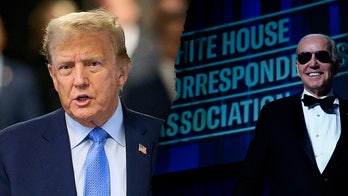Power Play 10-02-2012
Obama looks to restore stature on foreign policy, Romney to focus on high price of Obama policies
“One trillion, two hundred and seventy five billion, nine hundred and one million, seventy eight thousand, eight hundred and twenty eight dollars and seventy four cents”
-- The amount of new debt accrued by the federal government in the fiscal year that ended on Sept. 30.
American voters have every right to be skeptical of what both President Obama and Republican presidential nominee Mitt Romney say about the economy.
Obama has failed to deliver the recovery he promised would result from more than $1 trillion in stimulus measures, and is offering a prescription for more of the same in a second term. While economic optimism among voters has been inching up, there is no expectation that the country will resume the robust economic growth it has enjoyed so often in the past 30 years.
And Romney’s prescription for cutting taxes and lifting regulations sounds very much like what Republicans have been offering for a generation. Polls show Romney has lost much of his advantage over the president on economic policy, likely in large part because of the single-minded focus the president and his team have given to the idea that rich Romney is out to help his fellow plutocrats and hurt middle-class Americans.
Rather than believing that Obama has better economic policies, many voters seem to believe Team Obama’s other main argument: The situation is so bad that no one could fix it, not even Bill Clinton. But hey, at least Obama cares. At least he did something.
[pullquote]
So with voters throwing up their hands at the state of the economy and the ability of either party to deliver a real recovery, what’s a challenger to do?
At the candidates’ first debate on Wednesday in Denver, look for Romney to hone in on the cost of Obama’s policies.
“Failing is one thing. Failing in a way that leaves our children and grandchildren indebted for decades to come is another thing,” one senior Romney adviser told Power Play.
While Romney will certainly lay out his argument for why a smaller federal government and lower taxes will spur economic growth, the Republican nominee will be hammering away at the question of affordability.
Gallup showed last month that an overwhelming majority – 54 percent to 39 percent – still thought government was doing too much rather than not enough. That’s right about where that measure was ahead of the Republican landslide of 2010.
While voters may be unconvinced about Romney’s specific four-point plan to revive the economy after a decade of booms and busts, he has a strong argument to make that at least his plans are far more affordable than the stimulus proposals on offer from Obama.
“Voters are smart enough to understand that what the president is selling is very expensive,” said another member of Team Romney. “They saw it with his stimulus. They saw it with Obamacare. They understand Obama is a big spender.”
This line of attack also represents Romney running to daylight. Even in the gloomiest polls of the past three weeks, Romney has continued to outscore Obama on the candidates’ abilities to deal with the jaw-dropping federal debt.
The new Romney campaign theme that “We can’t afford four more years,” is leading up to the Republican nominee’s prosecution of the incumbent as someone whose failures are simply too expensive.
Obama’s main counterargument on this front is his pitch for increased taxes on top earners, which he says will finance some of his new second-term spending proposals. You can certainly expect to her Obama talk about the need for people like Romney – and here Obama often includes himself – to pay “their fair share” to finance new federal spending aimed at helping the middle-class swing voters crucial to this race.
Obama’s defense on debt is that he inherited the problem from George W. Bush and was then forced to take extraordinary measures to staunch the bleeding from the Panic of 2008, for which he also blames Bush.
And therein lies Romney’s greatest opportunity.
Most in the Republican base have come to resent the spending of the Bush era. Though the deficits and outlays look like a pittance compared to the era of Democratic domination, many Republicans have come to blame the leaders of their own party for launching the spending trend that gave the Obama Democrats free reign.
The Tea Party movement and the increasingly libertarian bent of the GOP is a reflection of the strong rejection in the party of what Bush called “compassionate conservatism.” Many Republicans would cheer if Romney took a stand against it. Certainly Bush himself has to have been expecting that this moment would come.
Romney would pay no political cost for publicly stating his disagreement with some Republican policies of the Bush era and would enjoy a tremendous benefit among the skeptical independent voters who tend to believe that neither party is up to the task of curbing excessive spending.
Obama’s argument is that Romney wants to return to “the same failed policies.” By taking a few shots at the Bush-era GOP, Romney might be able to convince his own base and moderate voters that he represents a new direction for his party.
Debt and deficit could be a double whammy for Romney: A chance not only to exploit Obama’s greatest weakness, but to burnish his own brand of reform Republicanism.
And Now, A Word From Charles
“I think one thing that is going to help Romney simply being on the stage. This is always true of the challenger, just being on the same stage as the president instantly raises your stature.”
-- Charles Krauthammer on “Special Report with Bret Baier.”
=====================================================
Chris Stirewalt is digital politics editor for Fox News, and his POWER PLAY column appears Monday-Friday on FoxNews.com. Catch Chris Live online daily at 11:30amET at http:live.foxnews.com.





